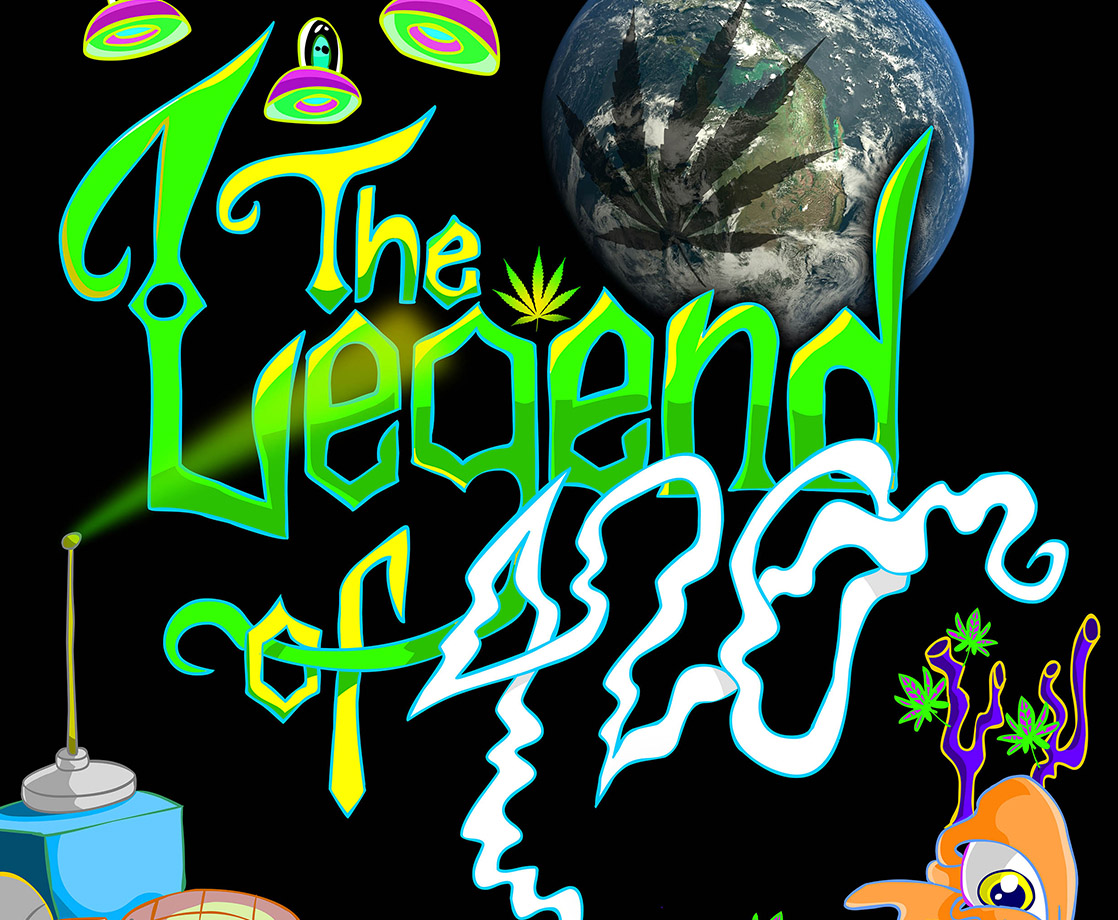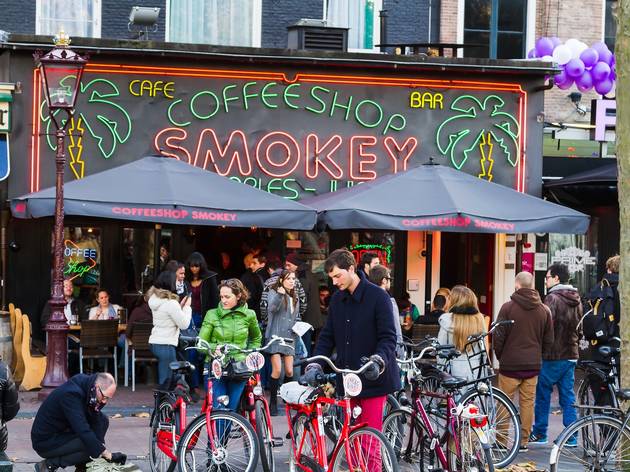Photos courtesy of Peter Spirer
The title of new documentary The Legend of 420 might lead you to believe that the film's an investigation into lightly-verified pot lore and the often goofy mythology that's arisen about its origins and early historical uses. Indeed, it opens with an over-the-top tale that equates Hitler getting high on his birthday (not coincidentally, April 20th) to an Allied victory in World War II. But that's a false start.
Instead, The Legend of 420 unfolds into a fact-based, well-researched exploration of the modern cannabis climate, no bullshit. Almost every conceivable angle is covered, from distributors who still operate illegally, to prisoners incarcerated for nonviolent drug offenses, to parents who seek out cannabis-based medical treatment for their epileptic children, to all sorts of businesses that have sprung up in the wake of legalization in some states. It's a fantastic summation of a legal issue and industry that both seem to change at a mile a minute.
Director Peter Spirer's background is mostly in hip-hop, directing exhaustive documentaries like Rhyme & Reason and Beef that survey huge swathes of the rap world. For The Legend of 420, he brings over some of the shocking revelations about our legal system that he documented in his past work. The director also has a clear gift for cramming his films full of interesting and informative talking heads. Celebrities like Tommy Chong, Henry Rollins, Melissa Etheridge, and Jason Mraz all contribute interviews alongside people more directly involved in the cannabis industry.
The film is a perfect starting point for people who know very little about the bustling contemporary world of cannabis, and it's so eclectic in its coverage that even the most seasoned experts will learn an interesting tidbit or two. Most of all, it's a cry for common sense. The Legend of 420 directly responds to critics like Jeff Sessions, and demands a more level-headed approach to our country's treatment of the plant.
Amid premieres of the film in LA, MERRY JANE caught up with Peter Spirer to discuss the making of his first-ever potumentary.
MERRY JANE: Hi Peter. What inspired you to make this documentary and what's your goal with it?
Peter Spirer:About a year ago, the CEO of my company said, "Hey, I'd really love to do a film on the legalization of cannabis, and I'd like you to do it." We've had a lot of success with projects together, and I told him right off the bat, I'm the wrong guy, man. I'm no expert, I'm an occasional cannabis user, but I'm certainly not an expert and wouldn't know one strain from the next. I'm just not that guy.
He said, "Listen, just read about it." I started getting into it, and my main lane turned into contempt for our government. Once I really got the full scope of this thing, I became pretty angry and realized that I should do something. Obviously, to the people in the know, this has not been a war on drugs, it's a been a war on people. I go back to Nixon, to the Shafer Commission. Over the years, there were other racist laws and whatnot, but the Shafer Commission should've been a turning point. Nixon had his cronies put this thing together hoping to identify with his agenda, and it completely disputed everything he had been saying, so he buried it. They were like "Yeah, if we regulate it tobacco and alcohol, it won't cause widespread panic or chaos. And it's actually good for you in some ways." It's amazing that this stuff was out there in '69.
Did any of this dovetail with your past work doing hip hop documentaries?
I also did a film on the prison industrial complex and hip-hop artists that get caught up in the prison system called Rhyme and Punishment, so the other connection I've made, which hasn't been spoken about much but I think it's really important, is that there's a profit motive to running prisons.
When I was making Rhyme and Punishment, I was amazed at the number of nonviolent criminal offenders. I could not believe it. Now they've gone down, but they're still unbelievably high. I realized that they need customers in their prisons. They need these people to generate income. But making this film, the connection I've made is that rather than keep the guys that probably should be in prison, like the murderers and rapists, those guys get kind of a pass to get out easier, and the nonviolent guys who are easier to corral, easier to manage, easier to maintain, end up incarcerated.
You've got liability issues with the guy who's a violent offender. He could attack a guard, he could attack another inmate, there are now all kinds of liability issues. So let's keep those guys who are nonviolent criminal offenders. Look, I haven't done any numbers on it, but it isn't hard to make that connection. It's such an injustice.

What about your personal history with cannabis, did that factor in at all?
I grew up with the brainwashing. I grew up thinking pot was as bad as these other drugs and heroin and all this stuff. And I had gotten my own personal motivation for all this stuff because three years ago, my brother passed away on prescribed medication. He abused it, but Florida, you can have three doctors writing you prescriptions. He assured me that all this stuff was legal, and all this stuff was prescribed by a doctor. I knew he was out of his mind using this stuff, and it eventually killed him. I think "God, if he had only been on cannabis." All of this medication could've been replaced by cannabis, which has never killed anybody. So it's crazy that it's a Schedule I drug and it's, when you start really looking at it, not because we don't know enough about it. When you look at the National Institute of Health's arm PubMed and they have 25,000 peer reviewed studies on cannabis, the whole thing's just a scam. It's just a complete injustice.
So I made this film kind of from my perspective, who didn't know a lot going into it. Now I feel like I'm way more up to speed on it because I wanted a film that was a celebration for people in the know, but also an opportunity for those who didn't know that much about this stuff to kind of get into it.
Where did you first go for sources that might be a little more "in the know," as you put it, than yourself?
A bunch of books, I just read through just a litany of stuff. Another journalist, Amanda Chicago Lewis, has some really decent things on the web. She writes for Rolling Stone. There's just a ton of stuff, negative and positive. My son is 19, so I've read the recent French study about kids under 25.
We've had criticism about the critics we've selected. The few I selected were people that are in the mainstream media. These are people whose voices I think represent a huge segment of our population. And they're ridiculous, I grant my critics of the critics that. Their points of view seem outrageous. But it's what a lot of Middle America thinks. And before we can get into "Hey, is cannabis a carcinogenic, is cannabis this?" we've gotta get past the idea that it's not heroin or crack. And there are a lot of people that think that still. So what I'm trying to do is deprogram the people that have been brainwashed for the past 50 years. And that's what this film intends to do.
So obviously if that's a goal, you're not gonna start off with some guy taking a massive bong rip. So how did you structure it with that goal in mind?
We did start off with that.
Really?
Yeah, there's an illegal transporter and when we follow him, he does a dab that's out of control. He's kind of the cliché of the stoner.
So you present that kind of in contrast to the way it's portrayed elsewhere?
Yeah, absolutely. We feature [cannabis college] Oaksterdam, we go to [medical dispensary] Harborside, we speak with advocates for epileptic children. We've got people that have been incarcerated and are now navigating this new world of legislation and what it means. It's definitely a survey film of the industry as it exists today. It's not a historical retrospective on cannabis, it's really more of a current affairs piece.

The title kind of led me to believe that it'd be a little more historical based or more about the mythology behind it.
When we first got going, I thought I would explore the title as a through-line for the entire film, but I kind of stepped away from that. First of all, the Five Waldos have their own things going, so I wasn't even sure I could connect with those guys. We do joke about the legend of 4/20 and what that means, but to me, the legend of 4/20 is about this new renaissance of cannabis and where it's going, and what the possibilities are, and this information that you're gonna get, and what this world could be in a completely legalized state. Part of it is what's going on with some of the laws that are happening, what you can do, what you can't do. Then we've got businesses and their interests, people that have been arrested and why, a little bit about the criminal justice system. And then we have a whole creative component about what it's like to be high and create, and making entertainment. It's a potpourri of the whole scene. And listen, there are things we've left out.
It sounds like it'd be a great introductory thing for me to show my parents, who don't know very much about cannabis legalization, but you also mentioned that there might be some stuff thrown in there for people who are more like connoisseurs.
I had some people that were at the premiere last night who were really hardcore cannabis users, and they felt they learned a lot. For instance, OG. I always thought that was original gangster, I didn't know what the hell that meant. We had a guy from the dispensary who said, "No, it's actually ocean grown." There'll be things you could pick up, particularly on the medical side, knowing the benefits. And when we show that, I think it's the most powerful part of the movie, when you get into the medical side of it. People were weeping when they saw that scene with the epileptic son, and when we give it to him, it just changes. It's so obvious.
Our art director bought a couple of clones, and after the shoot, I walked away with them. One of them died immediately. But the other one, I just put in a pot and I let it grow. I didn't try to fertilize it or put the nutrients it needed. So it didn't become this beautiful plant, but it's like this nice little plant. I love the way it smells. What was interesting was I'm watering the damn thing, and it's doing well, but the leaves on the bottom started wilting. And I was wondering, What is going on? What changed suddenly? And my wife goes, 'Oh my god, you won't believe it.' Dodger, my dog, is going over to the plant, and he's an older dog, and he's licking the leaves. I'm thinking, even a fucking dog knows that this stuff is good for you.
Learn more about 'The Legend of 420' on the film's Facebook page.
Follow Patrick Lyons on Twitter.











